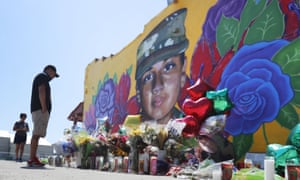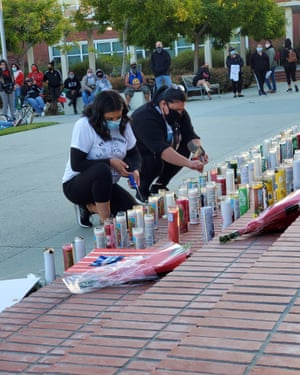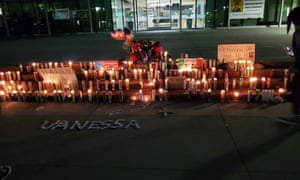At the steps of city hall in Richmond, California, sit dozens of half-melted candles with images of the Virgin Mary. In front of the makeshift altar, small white tea lights spell out “Vanessa.”
The display was erected on 6 July to commemorate the army specialist Vanessa Guillén, who had been sexually harassed by superiors at a base in Texas and was found murdered at the end of June. Hundreds of community members have gathered here every night to honor Guillén and other victims of sexual violence and mistreatment in the military.
The vigils have prompted community members to speak out with their own stories of sexual assault and other abuses in the military, and are catalyzing calls to scrutinize – and potentially ban – the presence of military recruiters on school campuses in cities such as Richmond.
“I see Vanessa as the military’s George Floyd. Her case is bringing attention to everything. And now we’re not scared anymore,” said Annette Luckey, whose daughter Danyelle died on a US aircraft carrier in October 2016.
The vigils in Richmond, a small, majority Latino city in the San Francisco Bay Area, started shortly after Guillén’s remains were found in June. Guillén had gone missing in April, and she had told her family and friends that she was being sexually harassed by two soldiers who outranked her. Following her death, the hashtag #IAmVanessaGuillen circulated among lawmakers and former soldiers who began sharing their own stories of sexual harassment and assault within their ranks.

Richmond native Estefany Sanchez had been following Guillén’s case since she disappeared. The 23-year-old had joined the army reserves in 2014 after being approached by a recruiter at Diablo Valley Community College in Concord, California, a suburban city about 25 miles from Richmond. Sanchez told the Richmond Pulse, a local newspaper, that while based in Concord she was sexually harassed on and off the base, and when she went to a higher-up she was told to “suck it up and move on”.
In May 2019, two weeks after she filed an official report about the incidents, she was discharged with no explanation.
The US army reserves did not immediately respond to requests for comment.
As news of Guillén’s murder sparked protests across Texas and cities around the US, Sanchez and her two sisters, Jackie and Nadra Sanchez, reached out to longtime community organizer Gonzalo Rucobo to help organize a demonstration to raise awareness in Richmond.
“I told them that whatever we do it needs to be more than a one-day event,” Rucobo said. “We want to bring awareness and create a safe space for women and the LGBTQ community who were affected by sexual harassment or assault.”
“It started as an organic thing to help the family of Vanessa then it became a gateway to help other families through their healing process,” he continued.
Since then, the movement has embraced community members with stories of all types of abuse in the military.

Annette Luckey’s daughter Danyelle died of sepsis in 2016, less than a month after boarding the USS Ronald Regan, which was stationed in Japan, for her first tour of duty. In 2018 Annette and her husband, Derrick Luckey, filed a lawsuit against the US navy alleging that medical staff aboard the aircraft carrier were reckless and neglected to give Danyelle the care that could have saved her life.
A US Navy spokesperson said there is no pending litigation pertaining to Danyelle Luckey’s death and the military branch has no comment on the matter.
They were represented by the whistleblower attorney Natalie Khawam, the same attorney who is working with Guillén’s family. Their case was dismissed in January 2020, but the Luckey family has continued to post on social media about their daughter’s case and their pursuit for accountability.
Micha Vargas, a local organizer with a son in the marine reserves and one in the US army said the movement has particularly resonated with Richmond’s Latino community.
“At every protest you’ll see the Mexican flag, Vargas said. “I feel like Vanessa is my daughter, like this is my baby. And if that happened to my child I would want my whole community, fighting, mad and angry for me.”
Vargas says that since she began organizing, she’s heard from many concerned mothers, some of whom have long feared to speak out publicly because of their immigration status. If passed, the federal Dream Act would create a pathway to citizenship for undocumented students who attend college or go into military service, but with citizenship riding on completing their service the program could be a double edged-sword for undocumented and mixed-status families, Vargas said.
“I’m lucky enough to be a documented person who doesn’t mind getting loud and saying, ‘This is our time to rise up for the people and let the military know that we have a voice and have the right to demand answers.’”
Military recruiters in Richmond
The allegations of mistreatment have sparked a fresh debate about the role of military recruiters in communities such as Richmond. Rucobo works with at-risk students through his organization Bay Area Peacekeepers, and says that many of his students see the military as a way to escape volatile situations at home, make money and have access to higher education.
“A lot of the kids say ‘I came from an abusive situation so I might as well stay in the military’,” Rucobo said.
But with increased attention on sexual assault in the military, organizers are trying to push local officials to block recruiters from coming on to high school campuses. As a part of the No Child Left Behind Act of 2001, military recruiters are mandated to have the same access to school campuses as college recruiters.

“We’ve known about harassment and assault in the military for some time but there’s also been denial,” echoed Isidro Ortiz, a board member of Project on Youth & Non-Military Opportunities (Project Yano). “Vanessa’s case puts it in our face and makes it starkly clear that this is an ongoing issue.”
In 2010 organizers with Project Yano got the San Diego unified school district board of trustees to regulate recruiting efforts in the district. The new regulations included: limiting military recruiters to two visits per school year and blocking recruiters from roaming campuses and approaching students.
In Richmond, organizers are hoping to make similar changes locally, and are imploring the city council to support their efforts to suspend on-campus recruiting until substantial changes are made to the ways complaints are investigated in the military.
“I was ignorant when my kids wanted to join and at first I was all for it,” said Micha Vargas, the local organizer. “Now, I hope that Vanessa’s case raises awareness for the youth of color so they can pursue different options.”







